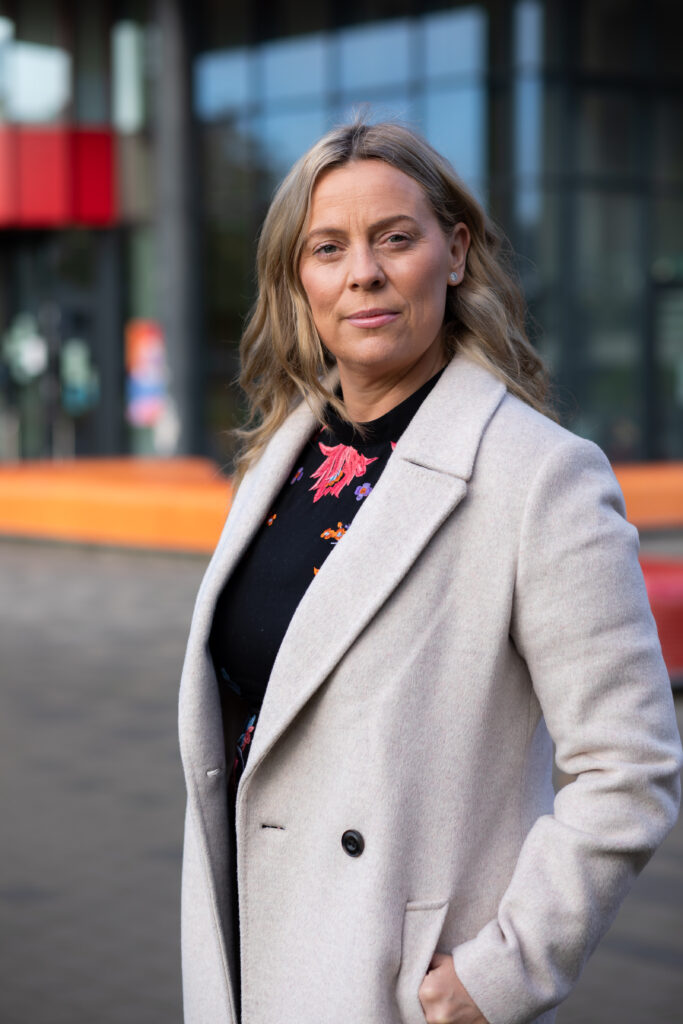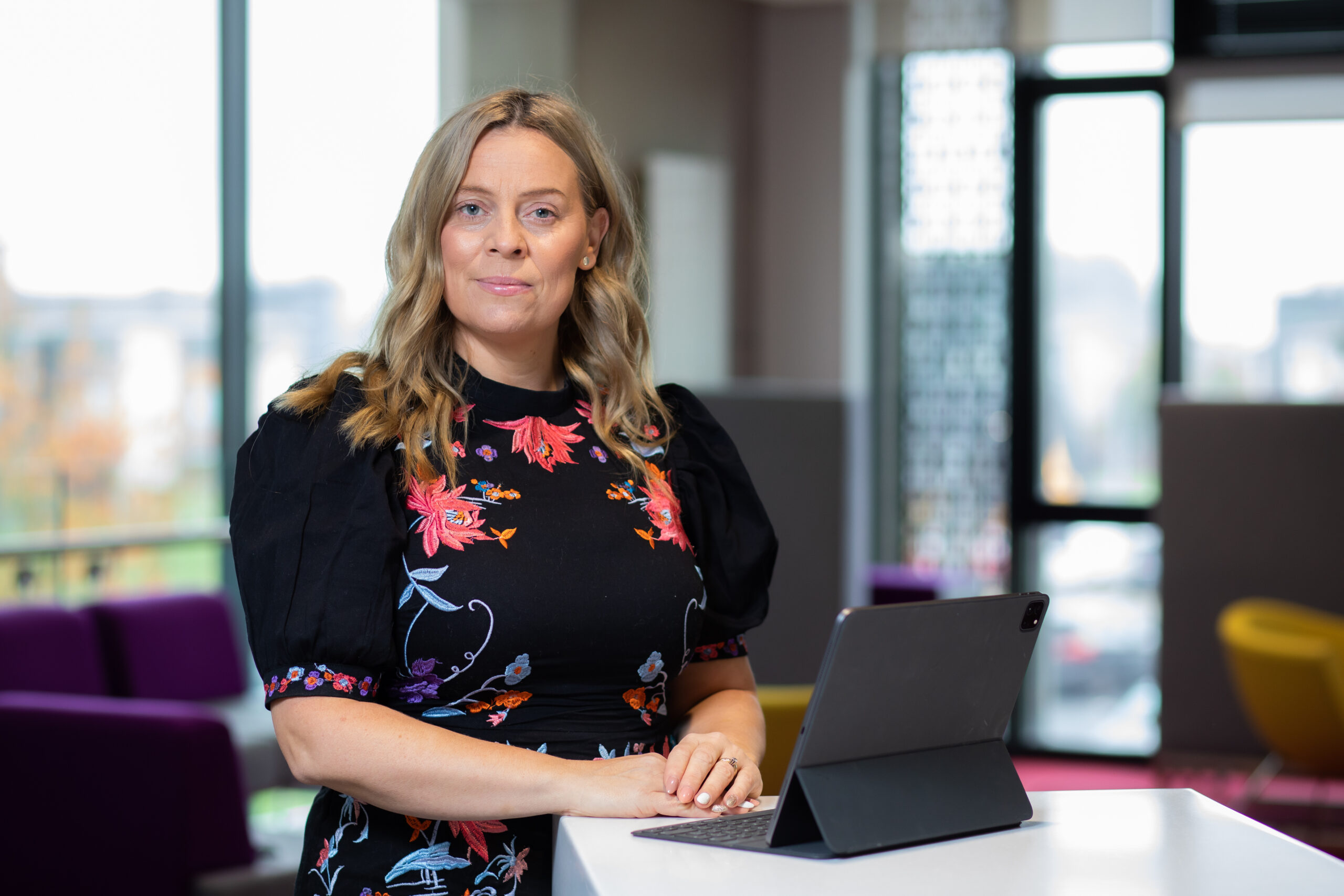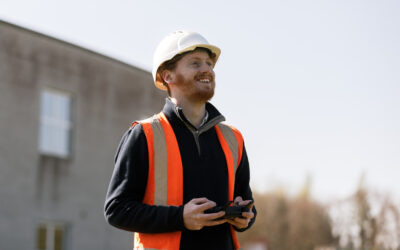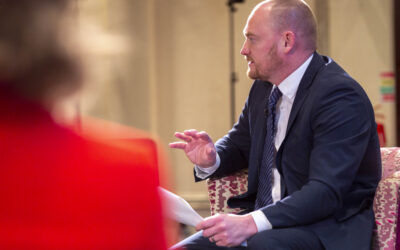Dr Katriona O’Sullivan is Lecturer of Digital Skills in the Assisting Living & Learning (ALL) Institute, Department of Psychology, National University of Ireland (NUI) Maynooth. She tells AIDAN PRIESTLEY how, growing up poor, the system failed her. Now, her work promotes fairness and she shares what can be done to expand access to the construction industry for girls and women everywhere
Born to heroin addicted parents in late 1970s Coventry in the UK, ‘Doctor’ is not a title Katriona O’Sullivan would have
expected growing up.
Coming from a disadvantaged background “there weren’t the same opportunities available to me,” she says compared to children growing in more well-off communities.
“Even though I was really bright, it was just hard for me to excel because I had all this other stuff going on in my life, like my family.”
In short, the system was incapable of supporting her needs. “I think school kind of lets kids like us down a lot,” she adds.
There were people though who went above and beyond for her at different times and she remembers them well. There was the teacher who fed and washed her every day and another who consistently praised her ability in class.
Yet the system simply bred rebellion.
“Most of the time I was just this wild girl who would tell teachers off and run out of class all the time,” she says.
Pregnant at 15, Dr O’Sullivan found herself homeless and gave birth in a shelter. From there she came to Dublin where she spent years in the city shifting between social welfare, cleaning Connolly Station and serving dinner at the Institute of Education.
One day at a community centre she questioned if this was the life she wanted. The answer was no and help came in the shape of support schemes offering therapy and adult education courses.
“I suppose my journey then began,” she says. “Discovering that I am absolutely an amazing woman who has the brains to burn.”
She then applied and was accepted into the Trinity Access Programme where she learned, in a formal sense, what she had already experienced. The education system “lets loads of people down and doesn’t really teach us how great we are,” she says. “And it made me really angry.”
It is that experience that has informed her focus, career and passion ever since. “My job is all about trying to make things fairer but it’s also about trying to let girls know that they can be and do anything,” she adds.
“Girls are told they have to be carers, wives or whatever. They’re told they can’t be certain things like builders or engineers, all these great jobs that should be normal for them and they’re told it’s not.”
She uses her experience as motivation, a difficult childhood compounded by a disinterested system. “School let me down, told me I was something I wasn’t,” she says.
Only as an adult and with support did she regain her confidence. “I use that to try and make it fairer for other
girls like me.”

Dr Katriona O’Sullivan
The three Ps
The process begins with people.
Dr O’Sullivan counts five people without whom her life would not be where it is today, recalling one educator “who actually came to my house and told me I had to come back to college”.
Even to this day she seeks guidance from those she considers role models, people in her life that support her.
“I don’t just mean the visual part of the ‘see it and be it’ role model”, she says. “I mean actually people who were willing to go the extra mile for me and actually show me the way.”
Then comes policy.
“It was right in the Celtic Tiger age when I started this and there was money, there was funding for support,” she says. Free education, childcare support and community creches “which all made a difference”.
This is a big part of the challenge facing people today as she adds: “Fundamentally, I think nowadays we don’t fund programmes and don’t have the policies that think about giving people time to build relationships with each other.”
Finally, there’s just good practice.
This means “going out into community groups, spending the day with people talking them through what it means to do things differently.”
There is a responsibility in each of us to reflect the changes we want to see.
“From a personal point of view be a person. Be the person to use the opportunities you have to help other people. Why would we not?,” she asks. “I think the hardest lesson that I ever learned when I went to college is that a lot of people get the benefit of the system and then they don’t use that benefit to make the system a bit fairer.”
She reflects on those who made that difference in her life at times of difficulty. “I had this self-destruct in me,” she says, describing her first year in Trinity College Dublin (TCD).
Despite excelling in the course she lost confidence and resigned herself to skipping exams and classes toward the end of the term.
She recalls how “the woman running the course came to my front door and asked why I stopped coming in. She told me ‘you can’t leave, you have to stay, you have to finish the year and then you can decide to stop, but you can’t leave before the end of the year’. That really helped me.”
The power of mentorship
Dr O’Sullivan has put that passion into practice running a mentorship programme out of NUI Maynooth. There are now 500 mentors registered, supporting over 5,000 girls in Deis schools.
It represents a formal structure for people to engage with to be the person who helps others. Ultimately, it all comes down to people.
“There are a lot of great initiatives that are working now to get girls into construction but I definitely think there’s a gap between the information and the actual programmes that are available,” she says. Part of that involves expanding who is involved in the conversation.
It means getting men involved and “getting them to care about why it’s a really important thing to think about but not in a tokenistic way, more in an empowering way, an understanding way.”
Then there’s the word that “loads of people hate” – quotas.
Dr O’Sullivan notes how it’s now mandatory for companies to produce a gender pay gap report but there is more still to be done. Not limited to the construction sector, she says, quotas have a role to play.
“I definitely think we need to go further with that and start to hold companies accountable for the lack of work they’re doing in terms of gender equality.
“That might be easier done in politics than in bricklaying but we definitely should be considering it in leadership positions in every industry, construction too,” she adds.
“This isn’t charity, it’s not tokenistic. When you add diversity to all levels of your business it adds value.”
She uses the analogy of a leaky pipeline to describe the different points along a girl’s career path where she is lost to the industry due to gendered stereotypes and barriers.
“From as early an age as seven girls are saying this is a boy’s job and that’s for girls. We have identified where this happens. We know where all the leaks are, we have to go now and fix them.”
At primary school level, for example, there is an opportunity to try to neutralise gendered terms like ‘he’s strong’ and ‘she’s caring’. As for her own work, Dr O’Sullivan is focused on secondary and further education and she sees the benefits of a number of initiatives.
“There are loads of apprenticeships and there is lots of focus on getting girls into construction,” she says. “There’s loads of that going on but we definitely need to flag it more and make it more attractive.”
Technology brings balance
As technology continues to develop and digital skills become ever more commonplace in all industries there is opportunity to address the historical imbalance in the industry.
“There’s no job that is escaping the digital revolution fully,” she says. “I think one of the myths that gets in the way of women participating in construction is the idea that it’s all about the physical and it’s all about strength.”
“It’s really not,” she adds. “Most construction jobs require problem solving, teamwork and the capacity to use emerging technologies within that area.”
From the ground up, through apprenticeships into senior levels, the industry has to be ready to provide a career path that works for women too.
She cautions companies to be aware of and mitigate against the ‘motherhood penalty’ which in turn contributes to the leadership
deficit or ‘promotion penalty’.
“Even though women are as good as men, we don’t get the leadership roles,” she says. “There are great initiatives that are going on at all levels to try to ensure that women stay in hard to reach jobs, but there’s not enough being done. We need to do more.”
Dr Katriona O’Sullivan is one of the keynote speakers at this year’s CIF International Women’s Day Summit on March 7.









